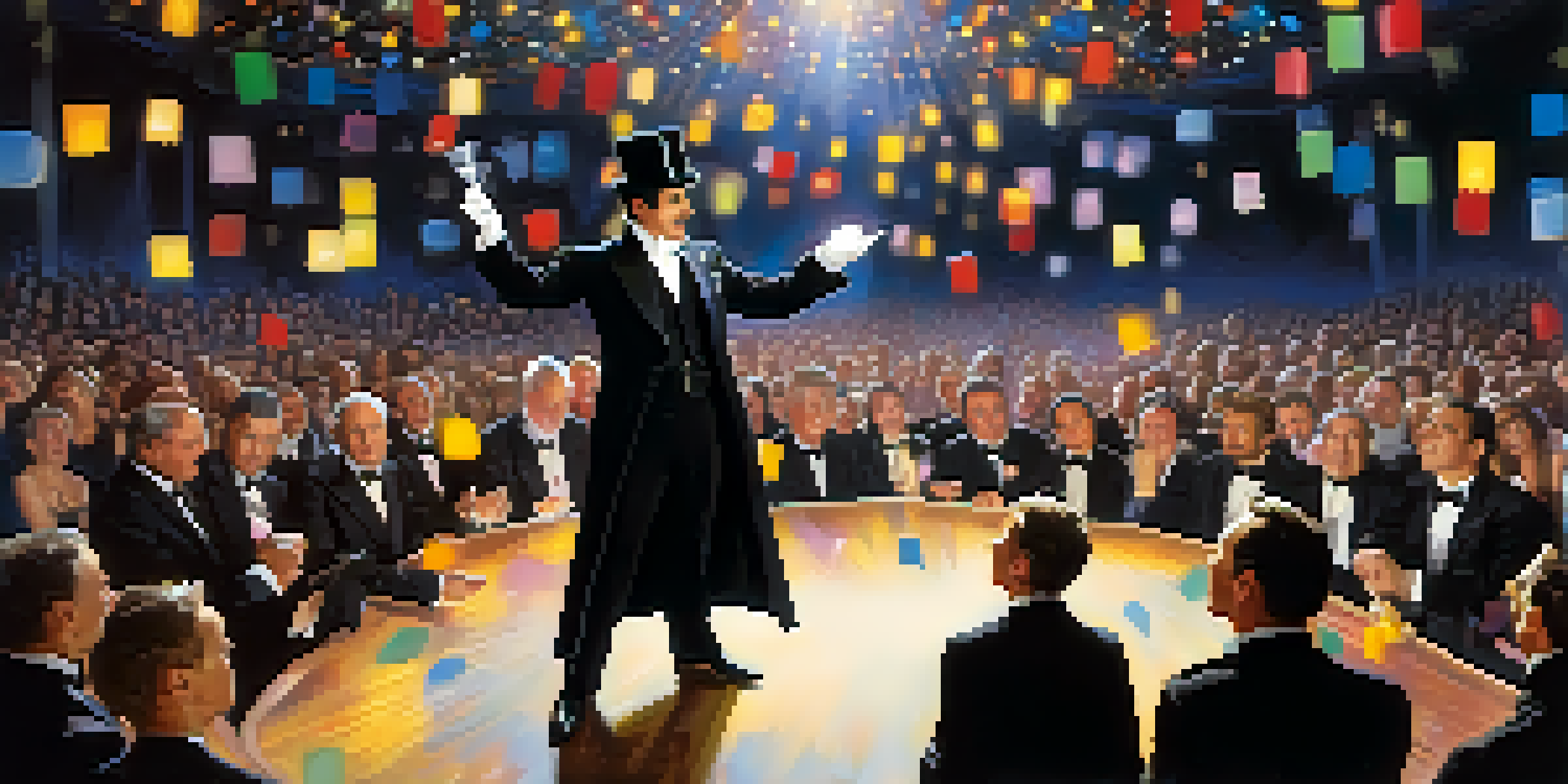The Ethics of Magic: Understanding the Boundaries of Performance

Defining Ethics in the Context of Magic Performance
Ethics in magic revolves around the principles that govern behavior and decision-making within performances. It's not just about the tricks but also about the integrity behind them. Magicians often walk a fine line between entertainment and deception, which raises important ethical questions.
Ethics is knowing the difference between what you have a right to do and what is right to do.
For instance, when a magician performs a trick that suggests supernatural abilities, they must consider how this impacts the audience's perception of reality. Misleading audiences can be entertaining, but it can also lead to misunderstandings about the nature of magic itself.
Ultimately, ethical magic respects the audience’s intelligence and emotions, ensuring that the experience is enjoyable without crossing moral boundaries. This sets the stage for a deeper exploration of ethical considerations in magic.
The Role of Consent in Magic Performances
Consent is a cornerstone of ethical magic. When audiences participate in a performance, they should be aware that they are part of an illusion, not a reality. Without clear communication about what to expect, the line between entertainment and deception can blur.

For example, a magician might invite a volunteer on stage for a trick. It’s essential that this participant understands the nature of the performance, ensuring their comfort and consent throughout the experience. This not only protects the individual but also enhances the overall enjoyment of the audience.
Ethics: The Heart of Magic
Ethical magic prioritizes integrity and respect for the audience's perception, ensuring performances are both entertaining and responsible.
Informed consent fosters trust and respect, allowing magicians to create a more engaging performance. By prioritizing consent, performers can maintain ethical standards while captivating their audience.
Deception in Magic: A Necessary Evil or Ethical Dilemma?
Deception is a fundamental aspect of magic, yet it presents a unique ethical dilemma. While magicians aim to astonish and entertain, they must navigate the fine line between harmless trickery and misleading audiences in a way that could cause harm. This raises the question of whether deception can ever be justified.
The greatest deception men suffer is from their own opinions.
Consider the classic 'vanishing act' where a performer seemingly disappears. While it's all in good fun, if audiences believe that the act is genuine, it could lead to confusion or even fear. Understanding the implications of such deception is crucial for ethical practice.
Thus, it's essential for magicians to consider the impact of their tricks on the audience’s perception. The goal should always be to entertain without causing distress or misunderstanding, ensuring that deception remains a delightful part of the performance.
Cultural Sensitivity in Magic: A Growing Concern
As the world becomes more interconnected, cultural sensitivity in magic performances is increasingly important. Magic often draws from diverse cultural traditions, and it's vital that performers approach these elements with respect and understanding. Failing to do so can perpetuate stereotypes and cultural appropriation.
For example, incorporating elements from another culture’s magic without understanding its significance can be seen as disrespectful. Audiences may feel alienated or offended, which undermines the very purpose of performing: to connect and entertain.
Consent is Crucial in Performances
Informed consent enhances trust and comfort, allowing audiences to engage fully while understanding they are part of an illusion.
By acknowledging and honoring cultural sources, magicians can enhance their performances and foster a more inclusive atmosphere. Ethical magic respects the roots of its art, promoting appreciation rather than appropriation.
The Impact of Technology on Ethical Magic Practices
Technology has revolutionized magic, offering new tools and methods for performers. However, it also raises ethical questions about authenticity and transparency. With the rise of digital illusions, magicians must consider how technology influences audience perceptions of reality.
For instance, using augmented reality in a trick can create a stunning visual experience. Still, it’s essential for the magician to clarify that what the audience is seeing is an illusion, not a supernatural occurrence. This transparency is crucial to maintain trust.
As technology continues to evolve, ethical considerations in its use will become increasingly vital. Magicians must strike a balance between innovation and ethical responsibility, ensuring that the art form remains genuine and engaging.
The Ethical Responsibilities of Magicians Towards Their Audience
Magicians bear a unique responsibility towards their audience, as they have the power to shape perceptions and emotions. It's essential for performers to prioritize the well-being of their audience, ensuring that their tricks do not lead to fear or discomfort.
For example, a trick that involves danger or risk should be carefully executed to avoid causing panic. By being mindful of the audience’s feelings and reactions, magicians can create a safe space for entertainment.
Cultural Sensitivity Matters
Respecting cultural origins in magic performances fosters inclusivity and prevents the perpetuation of stereotypes.
Ultimately, this responsibility extends beyond the performance itself. Ethical magicians strive to leave their audience with a sense of wonder and enjoyment, cultivating a positive experience that resonates long after the show.
Balancing Entertainment and Ethical Standards in Magic
Finding the right balance between entertainment and ethics is a challenge that every magician faces. While the primary goal is to entertain, adhering to ethical standards is equally important to maintain the respect and trust of the audience.
Magicians can achieve this balance by thoughtfully considering their material and the potential impact of their performance. They should aim to craft illusions that awe and inspire without compromising ethical values.

In the end, ethical magic is about creating memorable experiences that uplift and engage audiences while fostering a sense of responsibility. This balance is what elevates magic from mere tricks to an art form that resonates deeply.